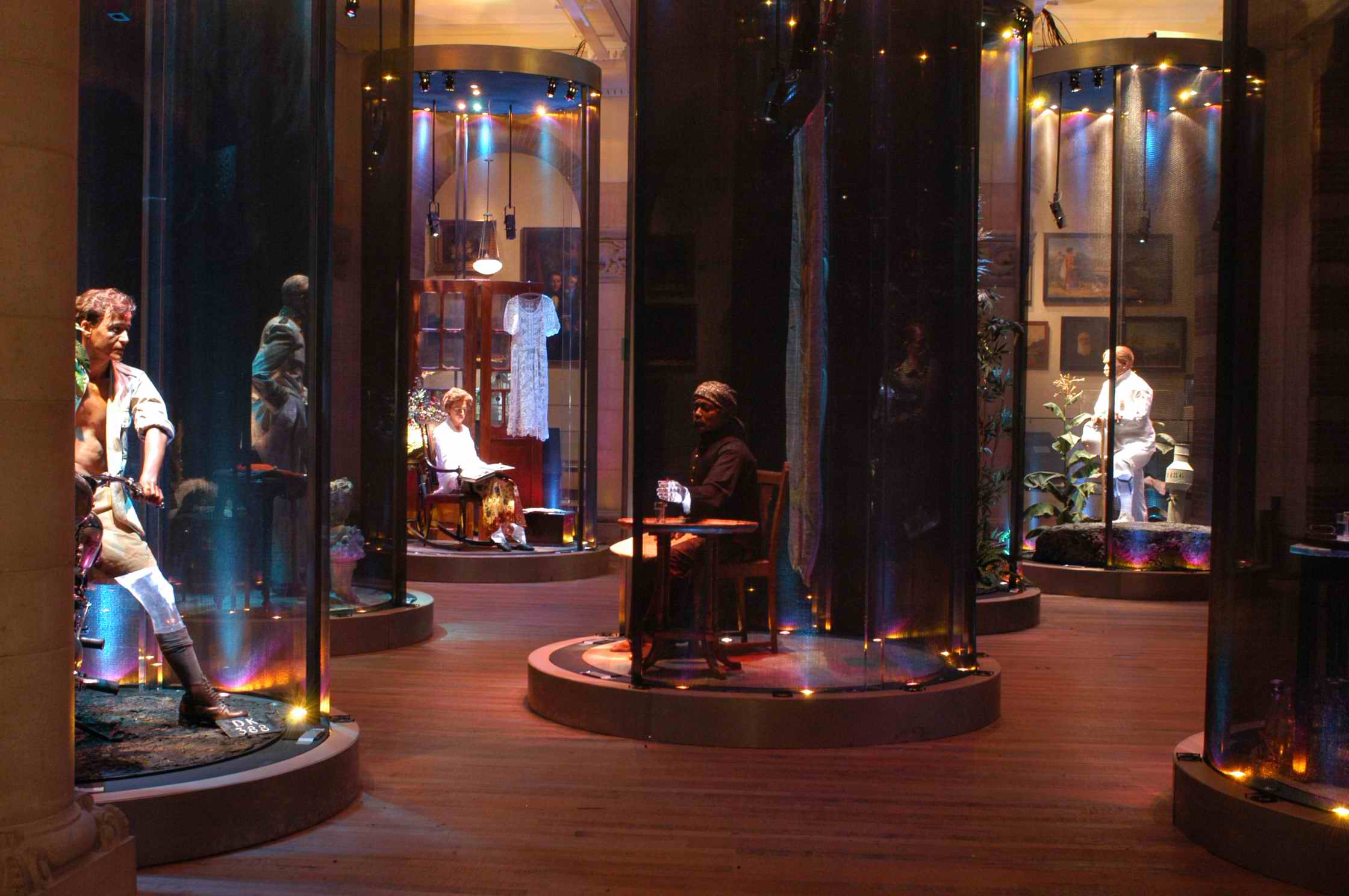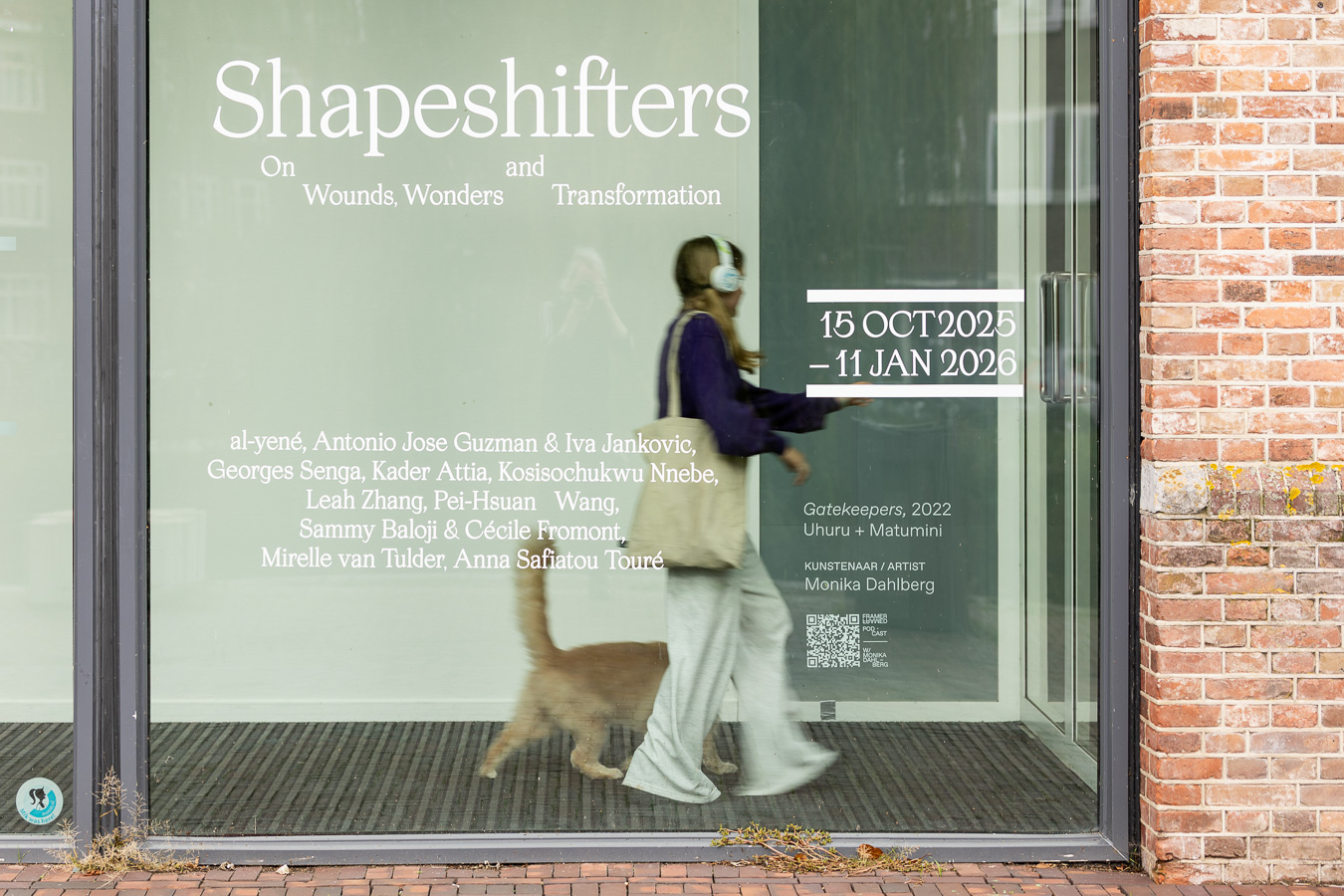 Exhibition entrance of Shapeshifters: On Wounds, Wonders and Transformation (2025) at Framer Framed, Amsterdam. Photo: © Maarten Nauw / Framer Framed
Exhibition entrance of Shapeshifters: On Wounds, Wonders and Transformation (2025) at Framer Framed, Amsterdam. Photo: © Maarten Nauw / Framer Framed Recensie: Shapeshifters: On Wounds, Wonders and Transformation
Text by Zsofi Ronai
October 2025
Walking into the exhibition Shapeshifters (2025) at Framer Framed feels a bit like stepping into a living conversation – one about history, healing, and the ways we carry the past into the present. Works by al-yené, Antonio Jose Guzman & Iva Jankovic, Georges Senga, Kader Attia, Leah Zhang, Mirelle van Tulder, and others create a dynamic space to interact with one other, offering interpretations on how the perception of cultural institutions has been shaped by colonialism. The group exhibition borrows its title from Octavia E. Butler’s stories of metamorphosis, using the idea of “shapeshifting” as a way to think about how people and institutions might adapt, heal, and reimagine their relationships to the colonial past. Rather than focusing on ownership or restitution in a legal sense, it invites reflection on care, connection, and the power of shifting the narratives.
The show continues Framer Framed’s long-standing commitment to questioning the stories museums tell and the systems that sustain them. Shapeshifters builds on this trajectory, connecting to the four-year research project Pressing Matter, which examines the value and ownership of colonial heritage. In this context, the exhibition translates those academic and political questions into an experience that feels both visual and emotional—less about conclusions, more about ongoing transformation.
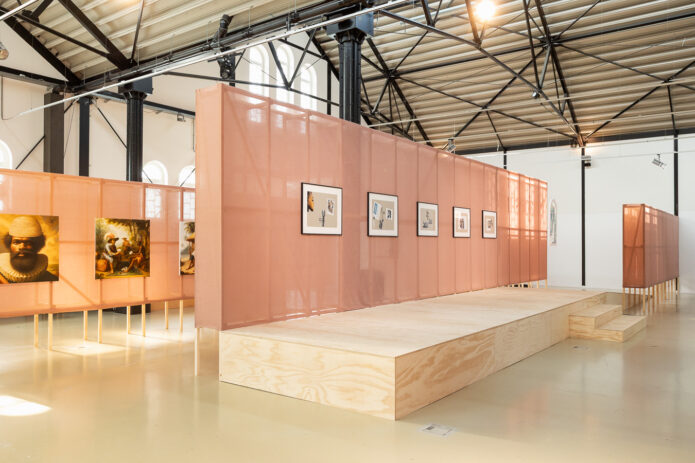
Installation photo from the exhibition Shapeshifters: On Wounds, Wonders and Transformation (2025) at Framer Framed, Amsterdam. Photo: © Maarten Nauw / Framer Framed
The layout of the exhibition designed by Bureau LADA invites you to wander rather than follow a set path. The space is layered with textiles, screens, and shifting light, so that what you see depends on where you stand. A mixture of sounds resembling the rattling of a (toy) train and electric club music accompanies visitors; invitations for exploring the installations of source. At the centre, a long, elevated platform invites gathering and observation; a place that asks you to pause and look again. The layout encourages lingering and slow looking; it allows the works to reveal themselves gradually —sometimes you glimpse something clearly, other times it’s half-hidden, like memory itself.
Among the artists featured, Sammy Baloji’s collaboration with art historian Cécile Fromont immediately draws you in. Commissioned by Framer Framed, the large-scale tapestry revisits colonial archives from the Democratic Republic of the Congo. Through layered imagery and archival material, Baloji exposes how extraction and exploitation continue to shape landscapes and social structures long after formal decolonisation. Pei-Hsuan Wang brings a more intimate perspective, weaving personal, family stories and mythological narratives into an installation. With a toy train in the form of a hedgehog plushie, objects from the collections of the Princessehof and Fries Museum, and a pair of ceramic statues in sancai style, Wang’s work explores migration, inheritance, and care. While miniature in detail, Anna Safiatou Touré’s The Faces Collection still stands out among larger scale installations. 800 imprints of masks originating from Congo are looking back at visitors upon closer inspection, reflecting critically on the place of these cultural objects within European societies and their institutions.
Together, the artists transform the idea of restitution into something living and dynamic, embodying the spirit of transformation the exhibition names. The artworks shift between poetic reflection and political urgency, revealing that decolonial repair is not a single act but an ongoing process of listening and reimagining.
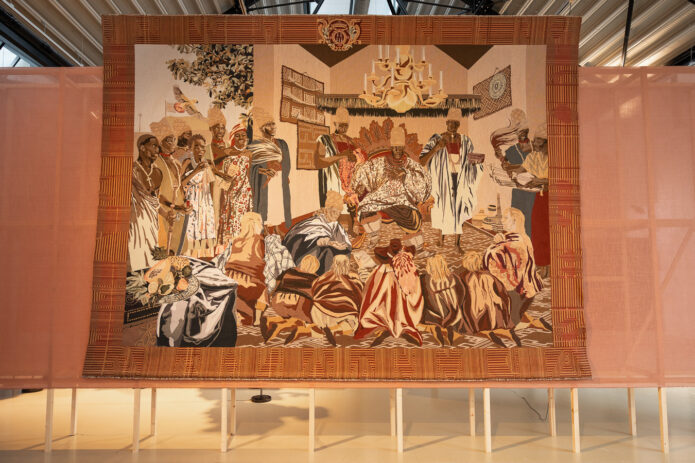
Sammy Baloji and Cécile Fromont, Rethreaded Indies (2025), as presented in the exhibition Shapeshifters: On Wounds, Wonders and Transformation (2025) at Framer Framed, Amsterdam. Photo: © Maarten Nauw / Framer Framed
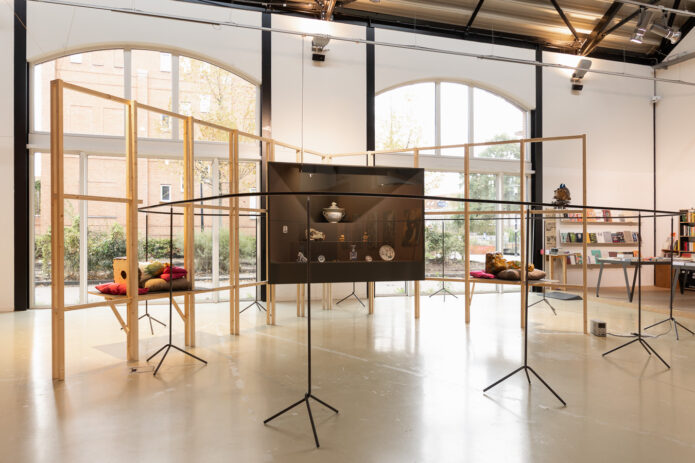
Pei-Hsian Wang, Origin Myth (2025) as presented in the exhibition Shapeshifters: On Wounds, Wonders and Transformation (2025) at Framer Framed, Amsterdam. Photo: © Maarten Nauw / Framer Framed
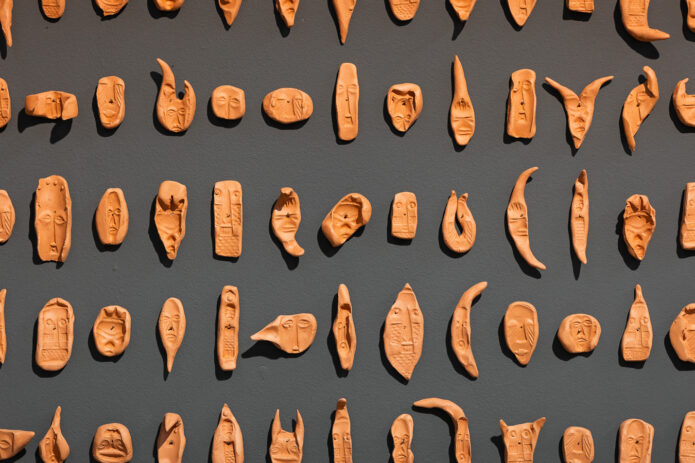
Anna Safiatou Touré, The Faces Collection (2025) as presented in the exhibition Shapeshifters: On Wounds, Wonders and Transformation (2025) at Framer Framed, Amsterdam. Photo: © Maarten Nauw / Framer Framed
Public Programme
A dynamic public programme extends these conversations beyond the exhibition itself, in collaboration with the Pressing Matter network. Initiated by The National Museum of World Cultures (NMVW) and the Vrije Universiteit (VU), the project brings together researchers from academic institutions and Dutch museums, including Museum Bronbeek, Rijksmuseum, NIOD Institute for War, Holocaust and Genocide Studies, The Black Archives and Framer Framed, among others. Selected through an open call, artists participating in the residency work with objects in the partner museums collected during the colonial period to explore forms of return and repair.
Framer Framed hosted the symposium Shapeshifters with three insightful panels on decolonial reparation, institutional responsibility, and the need for restitutions and community care. Speakers included artists Quinsy Gario, Kosisochukwu Nnebe and curator Vincent van Velsen, among others. The first topic of conversation revolved around negotiations between museums and communities for the return of cultural objects, as an attempt for reparation. While successful at times, the discussion highlighted the shortcomings of the approach, arguing that the affected communities are often left unheard. Speakers instead focused on alternative ways of reparation, ones that don’t rely on institutional processes. However, institutional responsibility was discussed in the following talk, seeking the transformative potential of museums. In other words, if not for reparation purposes, in what ways can we still benefit from an institutional presence in decolonial discussions? The conversation explored further strategies and frameworks to be implemented, while critically engaging with the nuances of the matter. The third panel was dedicated to the topic of community and care, raised before as an overlooked aspect in the restitution of cultural heritage. The artists and researchers in discussion reflected on the subject in relation to museological and archival research, preservation, and presentation. Further workshops and collective reading sessions invite audiences to participate in the ongoing work of imagining restitution as a shared, living practice.
In its thoughtful balance of aesthetic experimentation and political urgency, Shapeshifters transforms Framer Framed into a space of encounter and care. It acknowledges the wounds of the past while affirming the possibility of movement and renewal—an invitation to shape-shift toward more just and connected futures.
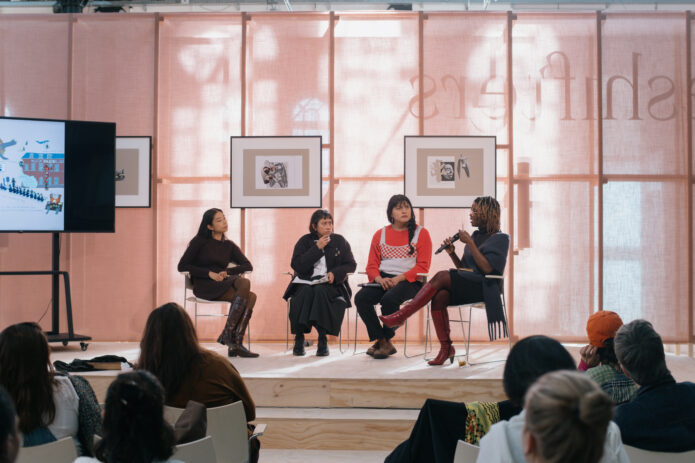
Panel conversation on Decolonial Reparation with Mili Herrera & Daniel Aguilar Ruvalcaba, Kosisochukwu Nnebe and Samboleap Tol, in conversation with: Nuraini Juliastuti. Symposium: Shapeshifters at Framer Framed (17 October 2025). Photo: © Ben Yau / Framer Framed
Museologie / Global Art History / Koloniale geschiedenis / New Museology / Textiel /
Exposities
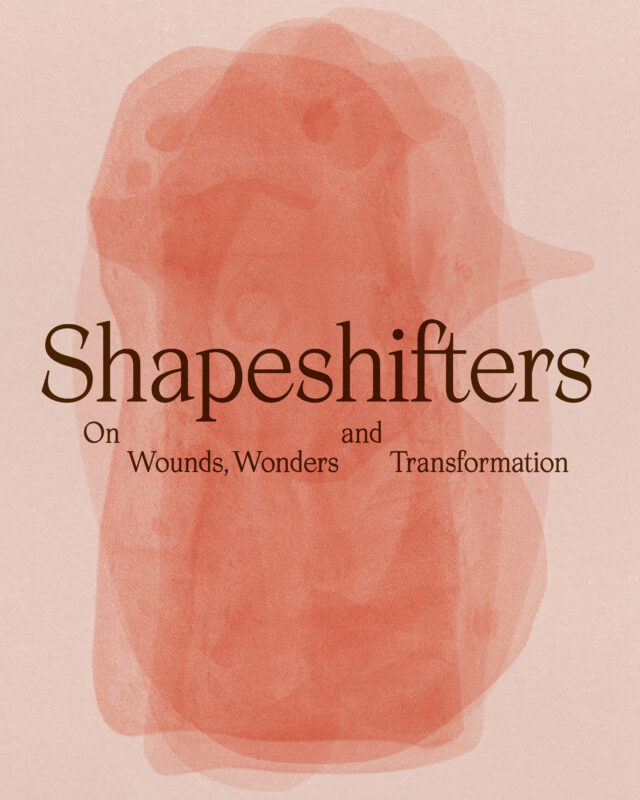
Tentoonstelling: Shapeshifters
Een groepstentoonstelling die onderzoekt hoe kolonialisme musea, archieven en andere kennisinstellingen heeft vormgegeven
Agenda
Workshop: Moulding the Mask, Finding the Face
Een tweedaagse workshop maskers maken waarin herinnering, erfenis en creatieve rituelen worden verkend via het tactiele proces van papier-mâché en klei
Symposium: Shapeshifters
Eendaags symposium over de ethische en culturele implicaties van collecties die zijn samengesteld door middel van koloniale plundering en exploitatie
Netwerk
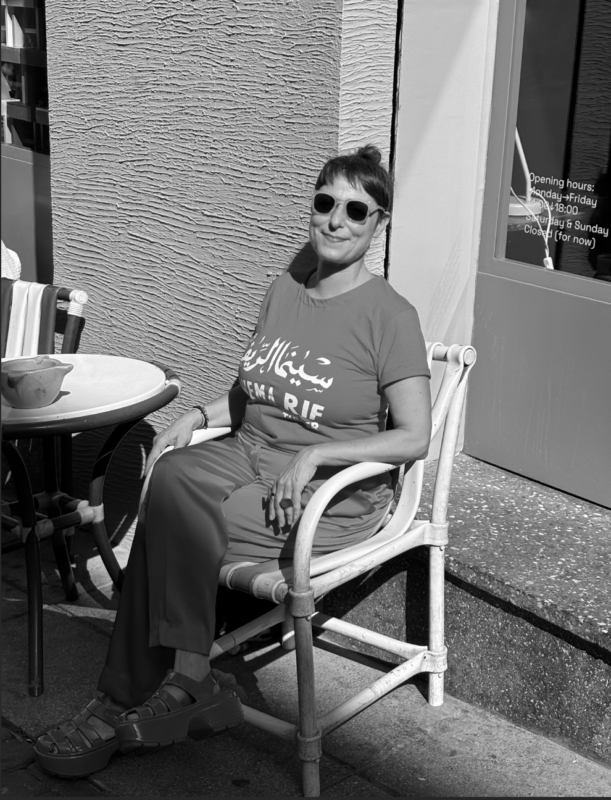
Lada Hršak
Architect and researcher
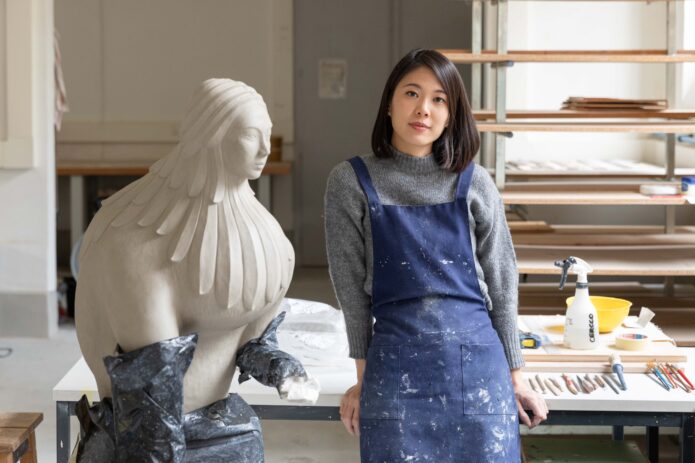
Pei-Hsuan Wang
Kunstenaar
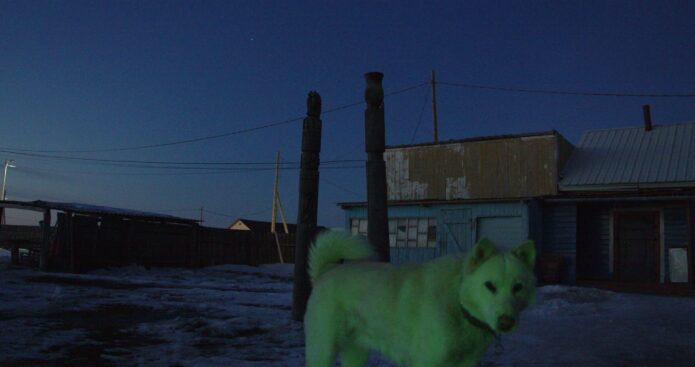
al-yené
Kunstenaar
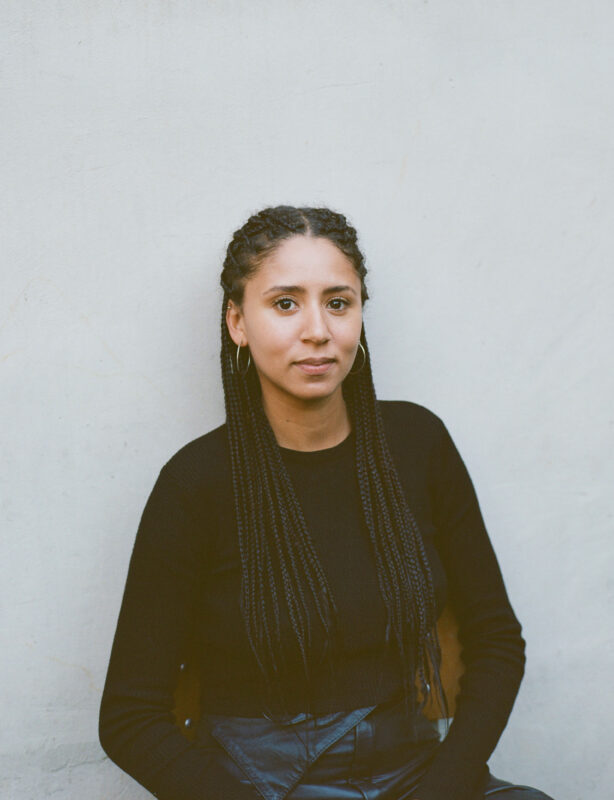
Anna Safiatou Touré
Kunstenaar
Cécile Fromont
Kunsthistoricus
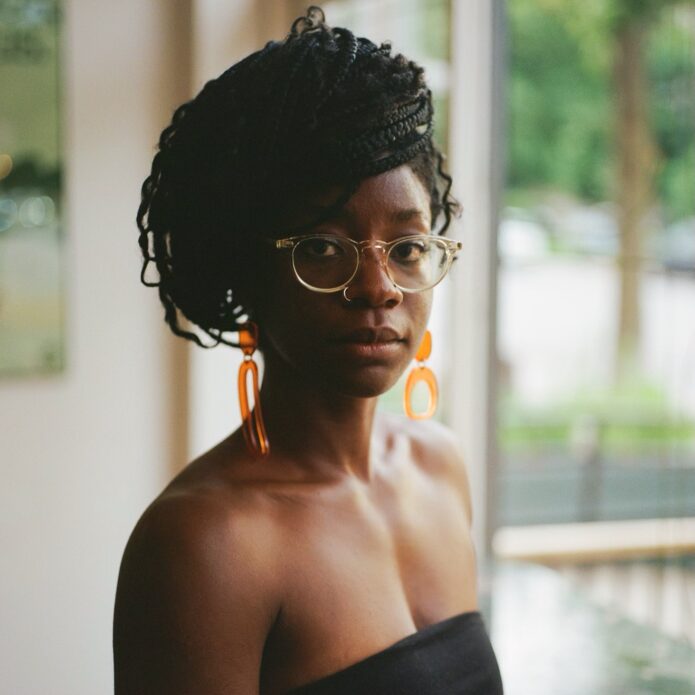
Kosisochukwu Nnebe
Kunstenaar
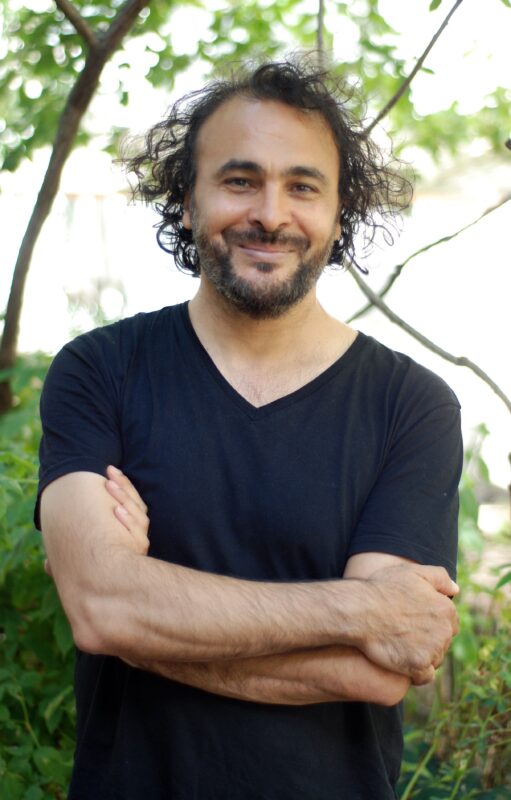
Kader Attia
Kunstenaar
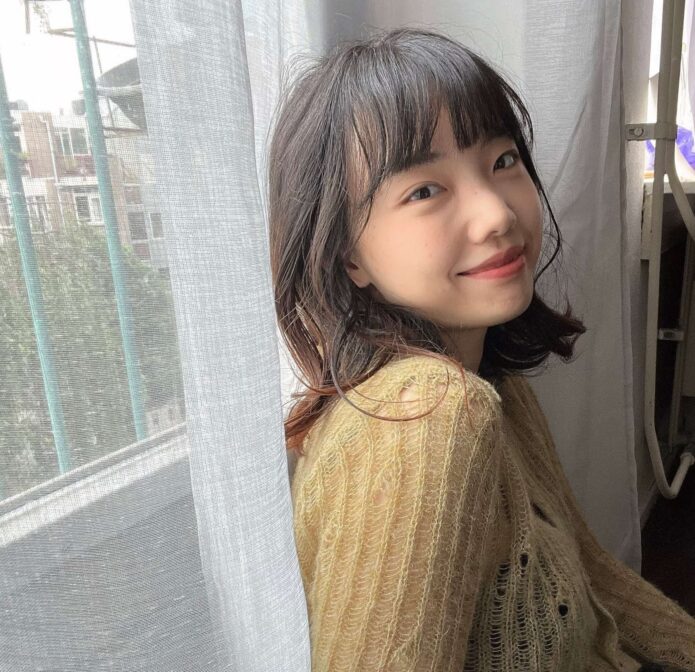
Leah Zhang
Kunstenaar
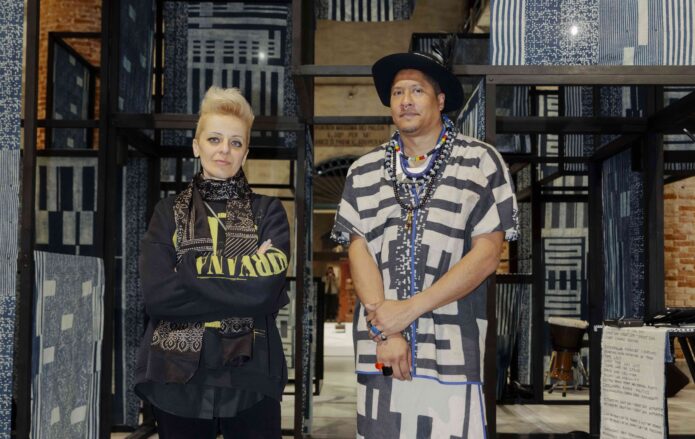
Iva Jankovic
Kunstenaar

Mirelle van Tulder
Kunstenaar, ontwerper en onderzoeker
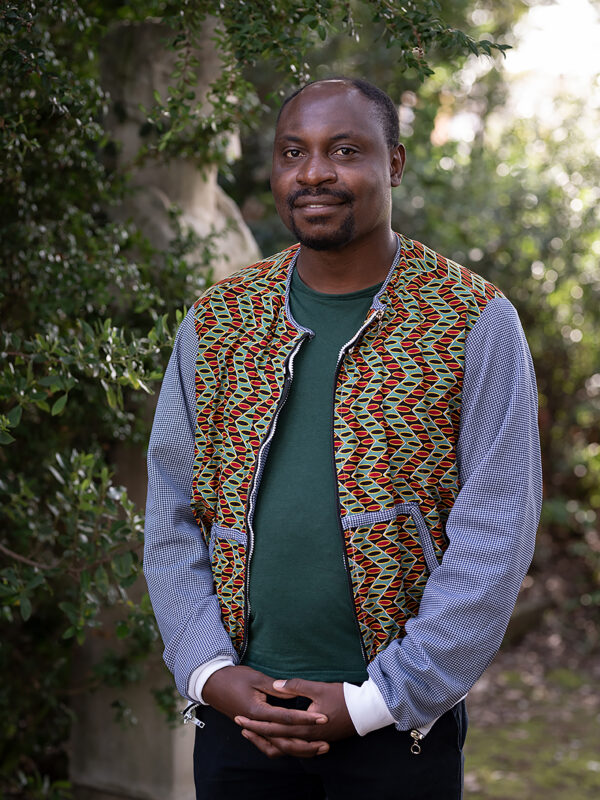
Georges Senga
Kunstenaar
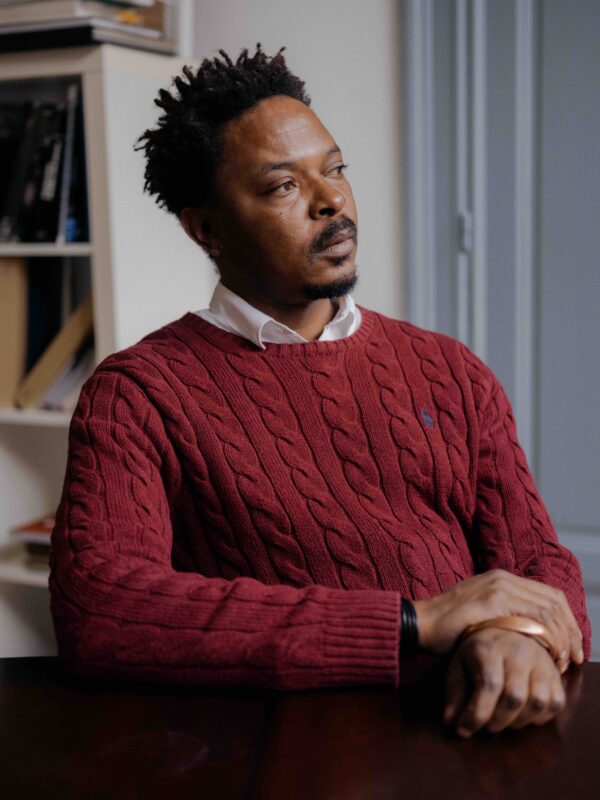
Sammy Baloji
Kunstenaar

